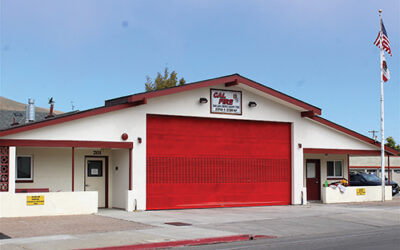County Supervisors recently approved one new contract and renewed an existing contract under federal employment training and worker’s assistance programs.
On June 20, Supervisors approved a new, $600,000 contract with Eckerd Youth Alternatives, Inc., for the 2023-24 fiscal year under the Workforce Innovation and Opportunity Act (WIOA) Youth services.
They also signed a $325,000 contract with Community Action Partnerships of SLO (CAP-SLO), to provide child care services under the California Work Opportunity and Responsibility to Kids or CalWORKs Program.
The CalWORKS Program began in the 1990s. “In 1997,” reads a County staff report, “our federal/state public assistance program was drastically changed to focus on minimizing ‘welfare dependency’ by increasing the number of working adults through expanded training and supportive services opportunities, and by giving states greater flexibility in the design and implementation of programs.”
Federally, the program was called “Temporary Assistance for Needy Families” or TANF, which left it up to the individual states how best to spend the money based on demographics. CalWORKS arose out of the TANF (a.k.a. Welfare-to-Work) and laid out specific ways to help families get into or back into the workforce.
In California that meant Counties have to provide child care for those in the CalWORKS Program, the report said. “If supportive services [i.e., child care] are not provided,” the report said, “counties must give ‘good cause’ for non-participation in the WTW program.”
Here, child care is essential for the CalWORKS program families. “Child care is necessary for most of our participants to support participation in assigned activities including work, training, education, drug and alcohol treatment, and/or mental health services.”
There are three basic categories of families that can get these child care subsidies: TANF/CalWORKS families; families transitioning off TANF/CalWORKS; and, “other low-income working families.”
In 2019, the State changed the program. “The approval of Senate Bill 80 [SB 80], in 2019 increased access to child care services for CalWORKs families by requiring a full time [30-hours or more per week] authorization to CalWORK’s Stage One Child Care immediately upon CalWORKs cash aid approval and continuously for 12 months or until the participants are transferred to Stage Two. This Immediate and Continuous Child Care was implemented as part of a two generational approach to disrupt the cycle of poverty by simultaneously focusing on the needs of parents and children. This has led to increased need for provider services and costs.”
Stage 1 is under the California Department of Social Services and is for welfare recipients; and Stages 2 and 3 are under the California Department of Education and for all low-income working families.
“The intent of the three stages,” the County report said, “is to avoid a break in child care services as a participant moves closer to self-sufficiency. In each of the three stages, families may choose their own provider. The provider must either be licensed or exempt from licensing [e.g., a family member providing care], and child care providers are paid directly for services performed.”
CAP-SLO, which is a private non-profit organization, and County Social Services have been working on this together since the program’s inception, having first entered into a contract in 1998.
CAP-SLO’s responsibility with this program “includes facilitating child care services and making direct payments to child care providers.” CAPSLO is approved by the California Department of Social Services “to handle State child care funds and generally serves an estimated 400 County children per year.”
CAP-SLO provides the County with the Resource and Referral Child Care Program to assist CalWORKs participants “in accessing immediate, quality and affordable child care as they begin their CalWORKs WTW activities and move towards employment and self-sufficiency,” according to the report.
CAP-SLO has one of its employees stationed in each Social Services Regional Office in the County, which the report said handles all referrals from the State DSS. CalWORKS participants are given a list of approved providers to select from.
“The process,” the County report said, “promotes parental choice and ensures that families have stable childcare that they are comfortable with.”
For more information about services offered by CAPSLO see the website at: www.capslo.org.
The contract with Eckerd Youth Alternatives is for $600,000 and falls under the “Workforce Innovation and Opportunity Act” or WIOA. Passed in 2014, WIOA is designed “to strengthen and improve the public workforce system and put job seekers back to work by helping workers acquire the skills employers need and help employers access the talent pool needed to compete in a global economy. WIOA Title I services include the provision of youth employment, training, and education programs in local workforce areas.”
Eckerd is a non-profit company and one of the biggest privately funded WIOA service providers in the U.S. The company operates over 60 WIOA programs nationwide including California and eight other states. The company began working in California in 1986 and is already under contract in SLO County to run a 1-stop career center, and WIOA Adult and Dislocated Worker Services. “Eckerd is also the current provider of CalWORKs Expanded Subsidized Employment services for the County.”
Eckerd’s contract came through a request for proposals bidding process, the report said, and with this first-year contract comes options for a second and third year extension.
The RFP identified the services the County was looking to provide, including: “the 14 required elements identified in WIOA [and identified below in Program Year 2023-2024 services]; a focus on out-of-school youth [OSY]; a minimum requirement of 75% of funding allocated towards WIOA eligible OSY; a requirement to serve transitional age youth 16 to 24-years old; and a requirement to expend at least 20% of WIOA Youth funds on work experience learning opportunities.”
Of note, Eckerd was the only one that responded to the County’s RFP and their proposal met all the State policies and Federal regulations under the WIOA; and passed through a technical review and a County committee put together to go over proposals.”
This WIOA Youth Program is comprehensive and “links local community, youth, and education stakeholders,” the County report said. “Specific types of services include tutoring, study skills training, instruction leading to completion of secondary school, alternative school services, mentoring, paid and unpaid work experience, occupational skills training, and appropriate supportive services [clothing assistance and transportation].”
Eckerd will work countywide and has offices in SLO at 3450 Broad St.
“Eckerd has a flexible approach for service delivery by providing access to WIOA Youth services through partnerships with local libraries, a satellite Eckerd facility in Atascadero, and community-based locations throughout the community. These various access points, in addition to an array of virtual services, allow youth to participate in career services within their local community.”
The money for WIOA Youth Program comes from the Federal Government to the States for allocation. SLO County gets money through a sub-grant from the California Employment Development Department and requires no matching funds from the County. Amounts can vary year-to-year and if all the money isn’t spent one year, it can be carried over to the next year.


